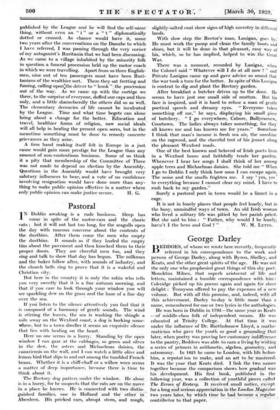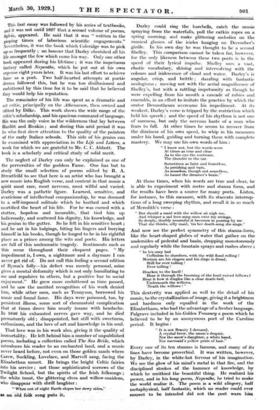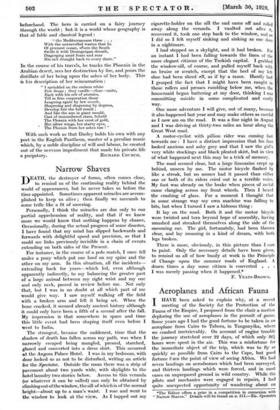George Darley
REDDOES, of whom we wrote here recently, frequently referred in his correspondence to the work and person of George Darley; along with Byron, Shelley, and Keats, and the other great spirits of the age. He was not . the only one who prophesied great things of this shy poet. MonektOn Mitnes, that superb aristocrat of life and letters, maintained a humble correspondence with him : COleridge picked up his poenia again and again kir sheer delight : Tennyson offered to pay the expenses of a new Volume. But with all this promise, and, indeed, with all this achievement, Darley to-day is little . more than a name, remembered for one or two lyrics in the anthologies..
He was born in Dublin in 1795—the same year as Keats —of middle-class folk of independent means. He was educated at Trinity College. At that time it was under the influence of Dr. Bartholomew Lloyd, a mathe- matician who gave the youth so .good a grounding that later, when poetry was proving her customary indifference to the pantry, Beddoes was able to earn a living by writing a series of primers in arithmetic, algebra, geometry, and astronomy. In 1821 he came to London, with life before him, a reputat ion to make, and an art to be mastered. It was the year that Keats died. I link the two names together because the comparison shows how gradual was his development. His first book,. published in the following year, was a collection of youthful pieces called The Errors of Ecstasy. It received small notice, .except for a long and serious appreciation in the London Magazine two years later, by which time he had become a regular contributor to that paper. This first essay was followed by his series of textbooks, and it was not until 1827 that a second volume of poems, *via, appeared. He said that it was " written in the gasping times of laborious scientific engagements." Nevertheless, it was the book which Coleridge was to pick up so frequently ; an honour that Barley cherished all his life amongst the few which came his way. Only one other book appeared during his lifetime ; it was the impetuous fantasy called Nepenthe, which he put out at his own expense eight years later. It was his last effort to achieve fame as a .poet. Two half-hearted attempts at poetic drama followed this, but he was too disillusioned and embitt,ered by this time for it to be said that he believed they would help his reputation.
The remainder of his life was spent as a dramatic and art critic, principally on the Athenaeum, then owned. and edited by Dilke. This work shows the wide range of the critic's scholarship, and his spacious command of language. His was the only voice in the wilderness that lay between Bazlitt and Ruskin ; and during this arid period it was he who first drew attention to the quality of the painters of the early. Italian schools. This side of his genius can be examined with appreciation in the Life and Letters, a work for which we are grateful to Mr. C. C. Abbott. The book is a scholarly and critical study of solid merit.
The neglect of Darley can only be explained as one of the perversities of the goddess Fame. One has but to study the small selection of poems edited by R. A. Streatfeild to see that here is an artist who has brought a new music into English verse, and content in that music a spirit most rare, most nervous, most wilful and varied. Darley was a pathetic figure. Learned, sensitive, and avaricious of intellectual companionship, he was doomed to a self-imposed solitude which he loathed and which mortified the heart of his life. For he was cursed with a stutter, hopeless and incurable, that tied him up ludicrously, and scattered his dignity, his knowledge, and his genius in the gutter. So he felt in his sensitive heart ; and he sat in his lodgings, biting his fingers and burying himself in his books, though he longed to be in his rightful place as a prince among the wits and poets. His letters are full of this undramatic tragedy. Sentiments such as this recur throughout their eloquent pages. " My impediment is, I own, a nightmare and a daymare I can never get rid of. Do not call this feeling a second edition of Byron's folly—his defect, was merely personal, mine gives a mental deformity which is not only humiliating to me and repulsive to others, but a positive bar to social enjoyment." He grew more embittered as time passed, and he saw the merited recognition of his work denied him, while other men, such as Tennyson, borrowed his music and found fame. His days were poisoned, too, by persistent illness, some sort of rheumatoid complication that at times drove him nearly insane with headache. In 1846 his exhausted nerves gave way, and he died prematurely old ; disappointed, but still with sweetness, enthusiasm, and the love of art and knowledge in his soul.
That love was in his work also, giving it the quality of immortality. He left behind him a number of unpublished poems, including a collection called The Sea Bride, which introduces his reader to an enchanted land, and a music never heard before, not even on those golden sands where Carew, Suckling, Lovelace, and Marvell sang, facing the Elizabethan sunset. He brings the bright Celtic fairies into his service ; not those sophisticated sorrows of the Twilight School, but the spirits of the Irish folksongs ; the white trout, the glittering elves and willow-maidens, who disappear with shrill laughter :
" When out of night Earth slopes her dewy sides,"
as an old folk song puts it. Barley could ring the harebells, catch the music spraying from the waterfalls, pull the catkin ropes on a spring morning, and make glittering melodies on the musical glasses. of the icicles hanging on December's girdle. In his own day he was thought to be a second Shelley. This comparison cannot be taken far, however, for the only likeness between these two poets is in the speed of their lyrical impulse. Shelley uses a vast, elastic vocabulary, shining and intervolving with the colours and iridescence of cloud and water. Darley's is angular, crisp, and brittle ; dazzling with fantastic neologisms ; moving not with the aerial magnificence of Shelley's, but with a rattling impetuosity as though he were expelling from his mouth a cascade of rubies and emeralds, in an effort to imitate the practice by which the orator Demosthenes overcame his impediment. At its weakest, Darley's verse is tripped by the restriction which held his speech ; and the speed of his rhythms is not one of sureness, but only the nervous haste of a man who fears to fall. At other times he seems to recover from the dizziness of his own speed, to whip in his measures under his hand, guiding and turning them with complete mastery. We may use his own words of him ; " I know not, but the words seem At times as true and clear As to the eye the sunbeam, The thunder to the ear.
Sometimes as faint and foundless, As perishing and vain, As senseless, though not soundless, As haunt the dreamer's brain."
At those times, when his words are true and clear, he is able to experiment with metre and stanza form, and the results have been a source for many poets. Listen, for instance, to this measure, with its staccato interrup- tions of a long sweeping rhythm, and recall it in so much of Meredith's verse : " But should a maid with the willow sit nigh me. And whisper a sad love-acing once over my strings, So deeply, doubly mournful it becomes in passing by me That she thinks, silly maid, 'tie her death-song she sings."
And now see the perfect symmetry of this stanza-form, like the heart-shaped globes of water that gather on the undersides of pedestal and basin, dropping monotonously and regularly while the fountain sprays and rushes above ;
" In his oozy bed Coffinlees he slumbers, with the wild flood rolling !
Mermen are his ringers and his dirge is dread, Still for ever tolling !
Ever tolling !
Hearken to the knell !
Hear it through the booming of the loud-voiced billows Hear it how it dingle., like a clear death-bell, Underneath the willows, 'Neath the willows ! "
This dexterity was applied as well to the detail of his music, to the crystallization of image, giving it a brightness and hardness only equalled in the work of the Elizabethans, who had the advantage of a fresher language. Palgrave included in his Golden Treasury a poem which he believed to be by an anonymous poet of the Caroline period. It begins : " It is not Beauty I demand,
A crystal brow, the moon's despair, Nor the snow's daughter, a white hand, Nor mermaid's yellow pride of hair."
Every one of its ten stanzas is famous, and many of its lines have become proverbial. It was written, however, by Parley, in the white-hot fervour of his imagination. We see the glow of his mind's metal in that fire, and the disciplined strokes of the hammer of knowledge, by which he smithied the beautiful thing. He realized his power, and in his long poem, Nepenthe, he tried to make the world realize it. The poem is a wild allegory, half metaphysical, half fantastic, which no reader could ever suspect to be intended did not the poet warn him beforehand. The hero is carried on a fairy journey through the world ; but it is a world whose geography is that of fable and classical legend :
" the Mediterranean three . . With the untravelled wastes that lie Of greenest ocean, where the South Swills it with Demogorgan drouth, Disgorging amid foam and roar His salt draught back to every shore."
In the course of his travels, he tracks the Phoenix in the Arabian deiert, sees her destruction by fire, and pours the distillate of her being upon the ashes of her body. This is his description of her reincarnation : " T sprinkled on the embers white Few drops ; they curdle—close—unite, Each with his orb of atomics, Till in firm corporation these Leaguing again by law occult, Shapening and shapening by degrees, Develop fair the full result ; And like the sun in giant mould, Cast of unnumbered stars, behold The Phoenix with her crest of gold, Her silver wings, her starry eyes, The Phcenix from her ashes rise ! "
With such work as that Darley holds his own with any poet in the English Pantheon, master of a peculiar music which, by a noble discipline of will and labour, he created of the nervous impediment that made his private life




















































 Previous page
Previous page